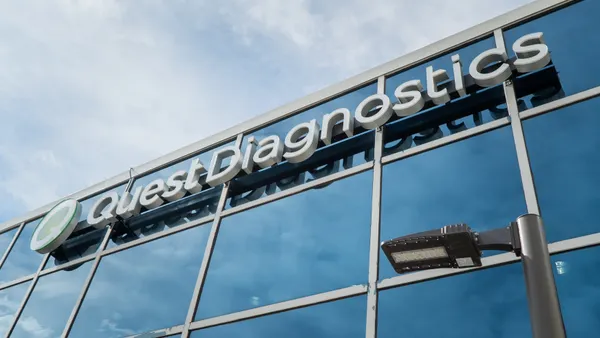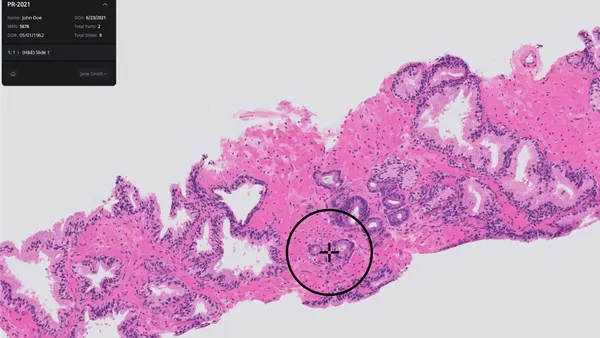Dive Brief:
-
LabCorp's diagnostics division grew revenues for the first time in 2019, leading the company to raise its outlook for the year. The uptick in requisition volumes seen in third quarter results posted Thursday was enough to offset the ongoing impact of reimbursement cuts under the Protecting Access to Medicare Act.
-
Quest Diagnostics' third quarter financials, shared earlier this week, were buoyed by its contract with UnitedHealthcare.
- But both companies face challenges, including a slower than expected pace of acquisitions for Quest and stiffer pricing pressures and trailing volume growth for LabCorp.
Dive Insight:
LabCorp went into 2019 expecting sales at its diagnostics division to fall by as much as 4%. However, the year has played out better than forecast. Diagnostic sales fell 2.7% and 2.9% in the first two quarters of 2019, leading LabCorp to raise its worst-case scenario to a full-year decline of 3% in July.
Now, the diagnostics division has returned to growth. Sales ticked up 0.4% in the third quarter as organic growth and acquisitions shared the load to offset a 1.3% negative impact from offloading business, like its 2018 sale of its Food Solutions business. The results, and the expectation of more growth in the fourth quarter, led LabCorp to predict revenues will fall 0.5% to 1.5% in 2019.
The unit is set to come under the new leadership of outgoing Covance CEO John Ratliff in the coming weeks.
Retiring LabCorp CEO Dave King told investors the results were "solidly within our performance expectations," adding that the financials reflect its retention of customers. Contract changes have exposed LabCorp to more competition with Quest this year.
Requisition volumes also returned to growth, rising 0.7% in large part due to acquisitions. LabCorp's volume growth is trailing well behind that of Quest, which beat consensus revenue estimates earlier in the week on the back of a 5.1% rise in requisition volumes. Most of the growth was organic, reflecting gains Quest has made since UnitedHealthcare and others changed their contracts.
Quest’s volume gains have come at the expense of its revenues per requisition, which fell 1.2% in the quarter. PAMA is one cause of the ongoing slide at Quest but, as the 1% increase in LabCorp’s third quarter revenues per requisition suggests, it is not the only factor. The prices Quest agreed to with UnitedHealthcare to get back into its network are also applying pressure.
"It is a significant price headwind relative to the rates we were being reimbursed as [an] out-of-network lab," Quest CFO Mark Guinan said on a call with investors Tuesday.
Despite that headwind, Quest, like LabCorp, was able to improve its outlook for the full year. Quest now expects to post net revenues of around $7.72 billion, close to the top of the prior range, and beat its previous earnings baseline.
However, other aspects of Quest's results led analysts to trim their longer-term forecasts. Quest identified M&A as a growth driver going into 2019 in the belief that PAMA pressures would drive consolidation. Management continues to see M&A as a growth driver but is yet to strike deals at the rate analysts expected.
"Most deals in our pipeline are taking more time to develop than they have in the past," Quest CEO Steve Rusckowski told investors. "These deals are getting bigger and more complicated. If it’s more complex, it takes more time."
LabCorp has its own headwinds for 2020. In the third quarter results, LabCorp said UnitedHealthcare has not renewed its BeaconLBS contract in Florida, meaning the diagnostics unit will take a hit from the fourth quarter onward. LabCorp CFO Glenn Eisenberg called BeaconLBS an "attractive business" with above-average margins.











